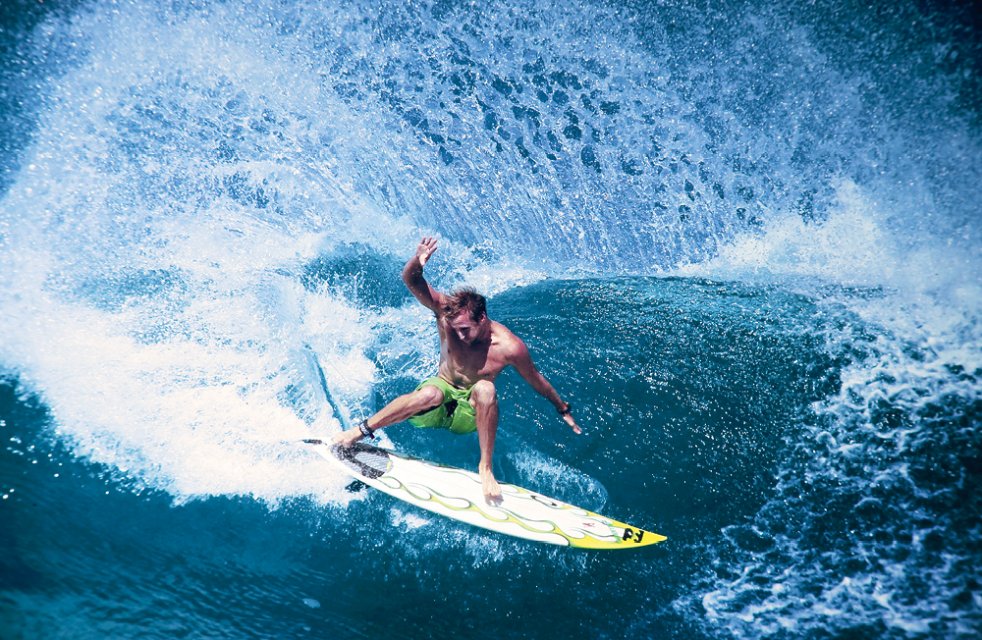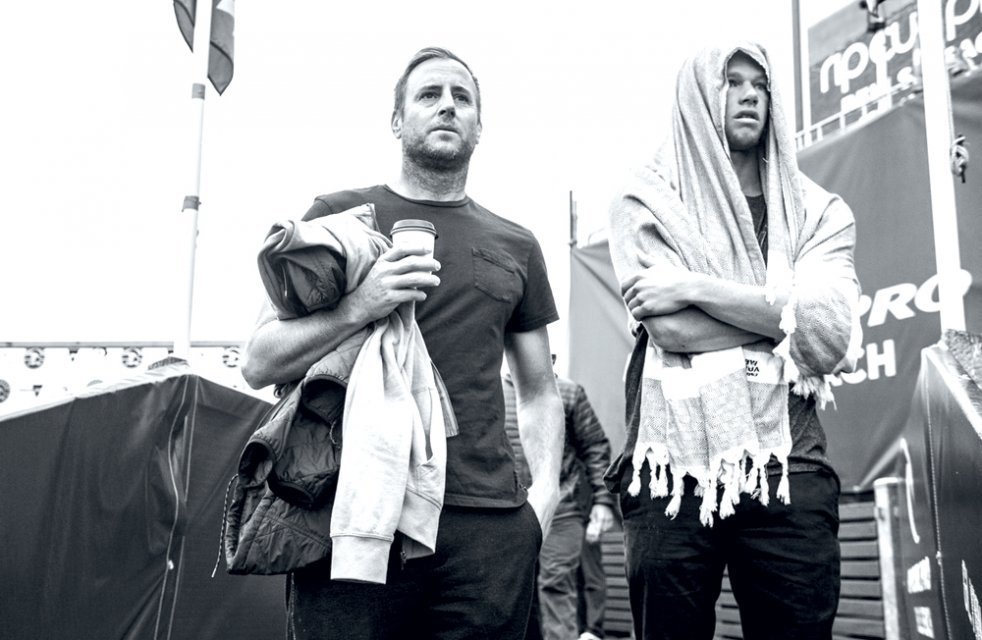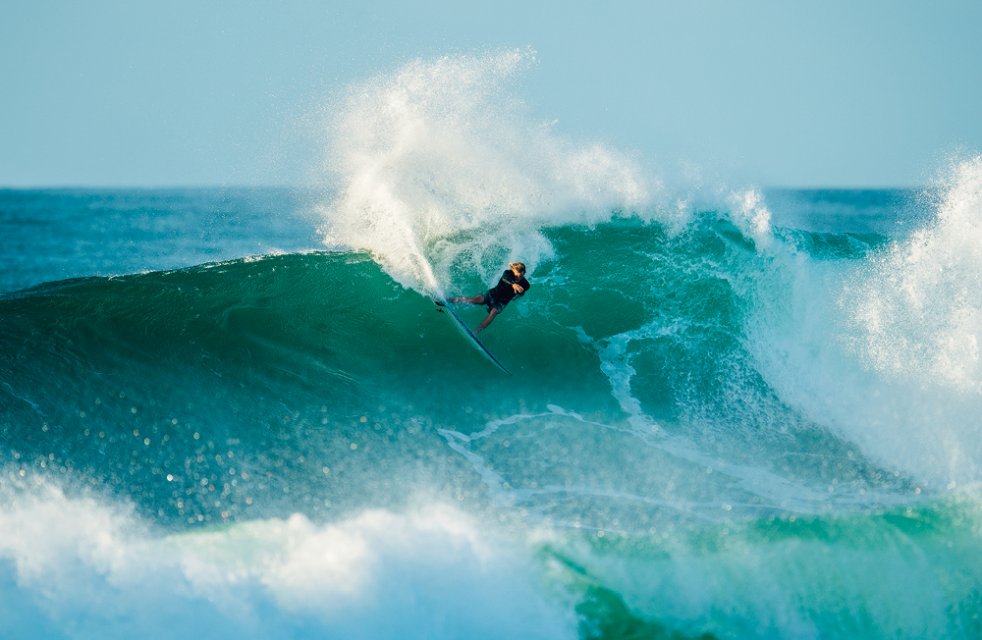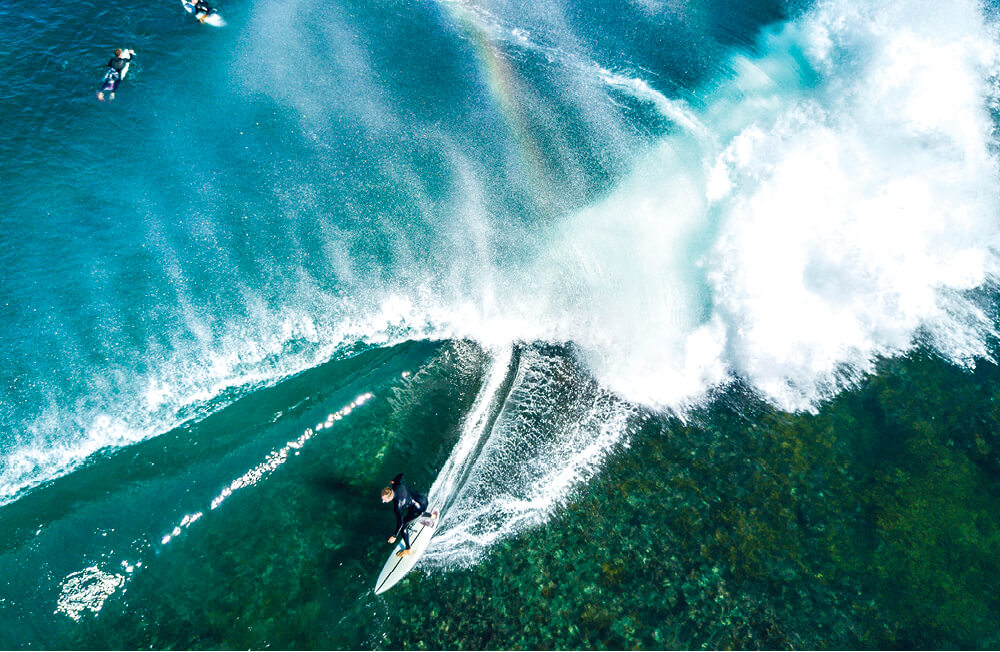John John’s Coach Spills Mad Secrets!
Share
Richards, Carroll, Curren, and Irons are the only men in pro surfing history to successfully defend their maiden World Title. Former WSL surfer and commentator turned coach/mentor Ross Williams believes his boy John John Florence will join that list by year’s end. But is the reigning World Champ going to fire up in the business end of the season? Or will he bow out of his title defence a sleeping giant? Here’s the inside word from Coach Williams, featured in SW #391 out Thurs October 5th…
SW: Righto Coach, how many raw eggs is JJF drinking every morning?
RW: He does eat healthy. He’s gotten some work done, so he knows what foods to avoid, but he’s also 24, so he’ll throw back a pizza here and there. He doesn’t eat perfect, but he does eat a lot. Him and his friends are dangerous for me to be around because I’ll literally eat a quarter of what they eat, but these kids are pounding 6000 calories a day or whatever, but John also surfs eight hours a day, so he’s famished. He watches what he eats, I don’t see him pound french fries and cheeseburgers all day, he’s pretty good.
How were you approached to take over the reigns from Bede Durbidge as John John’s coach?
John and I live in the same neighbourhood on the North Shore of Oahu. I’ve known him since he was a little kid. In the last couple of years I’ve mentored him a little bit. It wasn’t like a super cold start, there was a nice lead in. Bede did a couple of events the year before. So it’s not like Bede was his full time coach and then all of a sudden there was some drastic change. You’d have to ask John, but the way I envisioned it was he would start to feel out the vibe of receiving coaching, and getting some tips and he tested that with Bede. Obviously Bede has got such a great demeanor, very mellow.
Were any training systems carried over from Bede to you as his full time coach?
Bede had a couple of great solid, simple ideas that really helped John. I think Bede was the perfect guy to break the ice for John so far as soaking in some coaching goes. Let’s face it, a lot of the guys on tour don’t like to have that extra information because it clouds their own focus. Some of the guys want to go out in the water with their own ideas and they don’t want to be bombarded with extra information, whereas other guys enjoy it and I think John definitely learned that he liked it.

Who’s an example of a someone who’s enjoyed success on their own terms and structures?
No better example than Kelly. I wouldn’t say he’s against coaching, but he’s obviously made comments over the years like, ‘Why would I ask someone else how to surf Pipe when I know damn well how to surf Pipe?’ And fair enough, he’s got a great point. But everyone’s different. It doesn’t mean you’re telling someone how to surf. It’s just simply recalibrating and making sure they don’t miss something that they might have forgotten, or something that might’ve helped them win the heat.
Was there a bit of back and forth between you and Bede in terms of passing the baton?
A little bit. I have so much respect for Bede. I called him, and he actually reached out to me too because again, it wasn’t like it was some drastic change of ‘well I’m being fired.’ There was nothing like that. He literally did a couple of events, and Bede was so nice about it. We contacted each other at almost the same time and found this great mutual respect. Our conversation was basically, “John is ripping, this is what we’re doing,” so he wasn’t cryptic with any kind of tips that he thought could help John. It was already right on point with what I thought anyway. The first event he helped John with was Snapper and he was trying to work on flow. That was a big buzzword for him there. We rolled with that a bit too, but Bede’s just such a gentleman, that guy’s a cool cat.
The rail game John used to win at Margies. What are you telling him to do there? What was he saying back?
It would be cool to ask John how much influence I’ve personally had, but I can tell you we work on everything. I definitely don’t wax up his board, slap him on the back, and say, “Have a good heat.” The beauty of John’s personality is he’s super humble and willing to peel back all the layers of his surfing, and to be honest, that’s what gets me excited. Being a pro surfer on tour, and then being a commentator, my core was always geeking out on surfing. Looking at someone that rips and why. Fortunately for me, John likes that too. He’s obviously already an amazing surfer and a World Champion. So it’s not like we’re trying to start over. It’s adding layers, adding strength. John’s only 24, so it’s about being consistent and smart. He already has amazing flamboyance and flair above the lip. Along with Filipe and some of the other guys, he surfs with the most aggression and commitment on tour I would say. So it’s just about harnessing that and giving himself super high percentages of winning every heat as opposed to a highlight reel. I put alot of emphasis on this, because it involves structure in your heat, as well as solid technique. A lot of this goes back to his power surfing which you saw at Margies and J-Bay.
You were saying some of the initial conversations were about patience?
Here’s the cool thing, and it’s a bit nerve racking to be honest, but there’s no one way to win a heat in surfing. I would never tell John “this is what we’re doing” every event. You can stay super mellow and patient, drop anchor, and drop two big bombs – that might work at some places but not always. Other places, to be a little more frothy and to grom out actually works, like in Brazil in the shorebreaks where you need to better your scores, you catch a lot of waves amd bust a heap of big moves. So we work on many different strategies and that way he has options, he’s not cemented to one theory. Especially for someone like John who’s got all that ability on tap. I want him to go out there with all the options of strategy at his fingertips. Guys like Gabriel are frothy and catch a lot of waves, and John likes to surf that way obviously. And then you’ve got guys like Parko or Mick, who are super smart and patient. And Adriano, who’s just a tactician and constantly thinking throughout the heat and gauging other competitors, we really respect that too. I think John’s just trying to be as wide eyed as possible to take in everything. This is how I can potentially help because you can obviously think too much, and if you have this broad horizon thinking, “How do I win this heat today?’ That’s where I can take on the role as his mentor and coach, as a backboard to bounce off. I can say, “You know that the waves are doing this, you’re surfing against this guy, let’s try and focus on this today.” That’s where I think a coach can be really important, just to solidify a theory and a motivation for the day.

Are things like title predictions in some way a distraction from the task at hand? Is it easier to focus heat by heat than to look further into the ratings?
My take on it, and something I admire about John, is he can separate the two. He can push it away and say, “No, I’m only thinking heat by heat,” and I think that’s great for the day of, but of course you want to be motivated and you want to be goal orientated and I think John does that. It gives him something to aim for, for the whole 12 months. You don’t carry that with you every heat, but he does a really good job of finding balance.
Would you agree that the sense of urgency with this year’s campaign is not as prevalent as it was during his first World Title?
I would be careful to not confuse that with his motivation or his will to win. Again, this is just my opinion, but something that a lot of people might not know, because John is such a cruisy, humble guy, is how competitive he really is. Other guys are obviously competitive throughout the whole event. Beating their drum a little harder. But John doesn’t really do that, he does it in the form of surfing. But I can assure you he’s super competitive. All those guys on tour, including John, hate losing. Almost that alone is a crazy amount of fuel burning. They need to keep that flame lit. It is different this year because he won the World Title, but it’s a good thing. Again, he’s 24, so he’s maturing, and it’s about using that to his advantage. It’s about not burning excess energy and getting overly excited. If you look at someone like Mick or Adriano – who stay calm and make great decisions under pressure – people often confuse this with complacency or mellowness. So not the case with John. He is fired up.
“Here’s the cool thing, and it’s a bit nerve racking to be honest, but there’s no one way to win a heat in surfing.”
Have you seen cases where the heart on sleeve approach actually plays out to success?
It can be the case. In general, you look at most World Champions and they have a pretty common demeanor. They have good timing with burning energy and beating that competitive drum. It just comes down to personalities. You have to be true to yourself. There’s a lot of different ways to win a contest and win a heat, it doesn’t mean you can’t be true to yourself. Obviously John did it last year.
Looking back at previous examples, like his Tahiti final which he lost Kelly last year, how much does breaking down of those heats become a part of the winning formula?
Especially this year, not just Tahiti, but every event, that’s my job as his coach, to look back at all the tape, look at all his heats, and John does too, to see where he can get better. The most important heats are the ones that he has shockers in. France last year was one of his worst heats. He did well in the whole event but when he lost out to Keanu in the semis, everything kinda broke down a little bit. And those are actually heats that I love because it’s something that we shouldn’t repeat. So whenever John does have a shocker, which is not that often, those are the heats that I personally love to pick apart, and make sure we don’t repeat it.
It must have been a tough decision to choose between coaching John John, and staying on the WSL commentary team. What swayed your decision?
It was not easy for me, because I really enjoyed doing commentary those first few years with the WSL. It’s such a great job as an ex-pro surfer being able to have all that knowledge, being a pro surfer your whole life, and all of a sudden you have to shift gears, and when you’re 44 years old you think, “Ok, what do I do with all this knowledge or experiences sitting up in my head?” To be able to commentate was, for me, a relief. I really enjoyed the job, and it was not easy to switch over to coaching, but that being said, it fits that same criteria. It feels so good to potentially help someone like John with any ideas. I have a million of them in my head, I don’t know if you could ever hear it in my voice, but whenever I commentated I’d get very excited about peeling back all the layers of every surfer. Technically why they’re surfing great, or why they had a bad wave, and then everyone’s character, why they are successful with it or not. For whatever it’s worth, I feel so fortunate to have drawn from my past experiences into a new career. Again, to pull that trigger was really hard for me, and I am still so appreciative of the opportunity. The WSL was really cool about it. I thought maybe I’d do a little bit of both, but it’s such a full on job with John. It’s a full time job and I want to commit all my energy to John, but I think I’m on good terms with the WSL, so you never know what may happen in the future. Working with Pat Purnell the first couple of years was the most fun I’ve ever had. Working with Ronnie Blakey, he’s one of the funniest humans I’ve ever met and we had so many laughs in the booth, so yeah it’s good fun.

Any quotable moments from your time on the panel?
I will tell you, usually the third or fourth day of an event, especially the first couple of years, there’s a bit more grind because we were waking up early every single morning to do the morning show, so everyone was burning a lot of energy. A lot of times on the third or fourth day, late in the afternoon, it’s backlit and your on round three of whatever and that’s usually when you get the giggles. You’re beside yourself. I’ve had a few moments with Ronnie where we’re just looking at each other just dying, crying over something we said that just sounded stupid, it could have been something really simple, but when you get the giggles there’s no stopping it. Those were my favourite afternoons, even though they were tough and grindy, usually that’s when your stomach hurts so much from laughing, especially with Ronnie.
How was your transition from the top 44 to commentary? Was it hard to know what the next move was?
Absolutely. For me it was really hard, but it was also the best time of my life. I fell off tour in 2000. I had plans to do the QS and go back on the CT. I had no seed, because I did not compete in any QS events that year. So I went from 30th in the world to the middle of nowhere. So I went, “Ok, I need to spend a couple of years here to build my seed back up.” So that was the plan, then I broke my foot, in a cast, messed up for about a year. That really sidelined my career. Then I met my wife, got married, and started having kids. All those things guided me away from the tour. I took it as a sign. Luckily I had a good eight more years of freesurfing, but having a family and getting married was the best thing ever. After travelling for my whole life I really enjoyed settling down. But every guy goes through it, they get restless after a while, and being an ex pro surfer you wonder, “What do I do with all these tools?” So when the whole commentary thing presented itself, I jumped on it.
Does the issue of money become a stressful topic post professional surfing?
Yeah it can be. I was pretty good about putting my money away all the years I was a pro surfer. We were set up ok. My wife was a schoolteacher at Sunset elementary, so we were getting by. Definitely not wealthy by any means. Commentating was partially about trying to make ends meet, but also a way to reactivate the mind.
Is there a number one piece of advice you would offer the next wave of retired pro surfers in terms of afterthought?
I would say, if you’re not careful you can drift into almost PTSD. And it’s not because you experience something traumatic, but you go from all cylinders firing, all the endorphins and everything. You’re so focused on winning, all of a sudden it goes back to zero miles an hour, and life can feel really quiet. So the best advice I would give is to make sure you understand that this is a positive thing. You’re in a second stage of your life, whether it being getting married and starting a family or starting a career. Remaining optimistic and treating the next phase of your life as a great challenge, and conquering it, because if you start wallowing and staying home dwelling on the past, I think that’s where any athlete, I don’t care if it’s surfing or what it is, if you start dwelling on what you used to be, I think that’s where guys start going down a dark hole. That’s the cliché for athletes. For me I didn’t go quite that dark, but there’s been a handful of pretty famous pro surfers who have tampered with that type of life. No one’s excluded from that, it can happen.
SW #391 – Title Predictions – Out Thursday Oct 5.
[shopify embed_type=”product” shop=”coastalwatch-book-shop.myshopify.com” product_handle=”surfing-world-issue-391″ show=”all”]
